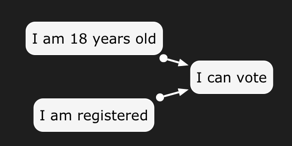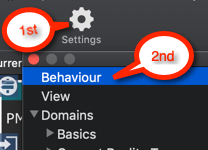Diagram Logic for Vithanco Diagrams
Estimated reading time: 2 minutes.
Vithanco diagrams can have an associated logic. They are guiding you to the right thinking. Vithanco has 3 different Logic Types.
| Name | Meaning |
|---|---|
| None | No logic associated |
| Sufficient Cause | Sufficient Cause means that from one statement the next statement follows. |
| Necessary Condition | Necessary Condition means that each of the predecessor statements need to be fulfilled for a statement to be true. |
Examples
So, in a sufficient cause diagram, the following makes sense:

Sufficient Cause Example
When I eat I am less hungry than before. Being less hungry is a direct consequence. Eating is sufficient to reduce hunger (ignoring some psychological effects). In comparison, preparing food is not sufficient. You can prepare food and not eat it. That leads to necessary conditions.

Necessary Condition Example
It is not sufficient to be 18 years old, you need as well in order to be registered in order to vote. Unfortunately, this diagram would not tell you if there are 3 conditions to be met in order to be able to vote, like living in a democracy.
How to use this?
- First and foremost, it should influence the way you think about the diagram.
- Choosing the right logic makes the model more comprehensive. You can use And/Or junctors in order to add more expressiveness to the diagram.
- Theory of Constraints (TOC) uses these two diagram types extensively. TOC is based on designing logically correct diagrams.
- If you drag from a node to a line in a sufficient cause diagram then Vithanco will create a AND junctor for you, do the same in a necessary condition diagram Vithanco will create a OR junctor. Both junctors are part of the Basics Domain.
- In the future Vithanco will use the logic type for diagram reviews. More on that at a later time.
How to change the Diagram Logic
The diagram's logic is shown in the upper center, in a non-obtrusive way. If you want to change it then need to go into the settings dialog and choose "Behaviour" in the settings dialog.

How to change the Diagram's Logic
Then choose the intended logic.

Change the Logic here
